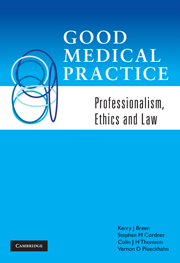Book contents
- Frontmatter
- Foreword
- Contents
- List of tables
- Preface
- Preface to the 1997 edition
- Acknowledgments
- About the authors
- Table of cases
- Table of statutes
- 1 Ethical principles for the medical profession
- 2 Ethical and legal responsibilities of medical students
- 3 Communication skills
- 4 Consent and informed decision making
- 5 Confidentiality, privacy and disclosure
- 6 Medical records, reports and certificates
- 7 Negligence, professional liability and adverse events
- 8 The regulation of the medical profession
- 9 Health care complaints systems
- 10 The doctor and sexual boundaries
- 11 Personal health of the doctor: illness and impairment
- 12 Maintenance of professional competence
- 13 Ethics and the allocation of health-care resources
- 14 The Australian health-care system
- 15 The doctor and interprofessional relationships
- 16 Entering and leaving practice and practice management
- 17 Clinical research
- 18 Prescribing and administering drugs
- 19 Diagnosing and certifying death and the role of the coroner
- 20 Births, reproductive technology, family law and child protection
- 21 Termination of pregnancy and related issues
- 22 Withholding or withdrawing treatment in the seriously or terminally ill
- 23 The law and the mentally ill
- 24 The law and courts of law in Australia
- 25 Medico-legal examinations and reports, court procedures and expert evidence
- 26 Other legislation relevant to medical practice
- APPENDIX 1 AMA CODE OF ETHICS – 2004
- Index
- References
6 - Medical records, reports and certificates
- Frontmatter
- Foreword
- Contents
- List of tables
- Preface
- Preface to the 1997 edition
- Acknowledgments
- About the authors
- Table of cases
- Table of statutes
- 1 Ethical principles for the medical profession
- 2 Ethical and legal responsibilities of medical students
- 3 Communication skills
- 4 Consent and informed decision making
- 5 Confidentiality, privacy and disclosure
- 6 Medical records, reports and certificates
- 7 Negligence, professional liability and adverse events
- 8 The regulation of the medical profession
- 9 Health care complaints systems
- 10 The doctor and sexual boundaries
- 11 Personal health of the doctor: illness and impairment
- 12 Maintenance of professional competence
- 13 Ethics and the allocation of health-care resources
- 14 The Australian health-care system
- 15 The doctor and interprofessional relationships
- 16 Entering and leaving practice and practice management
- 17 Clinical research
- 18 Prescribing and administering drugs
- 19 Diagnosing and certifying death and the role of the coroner
- 20 Births, reproductive technology, family law and child protection
- 21 Termination of pregnancy and related issues
- 22 Withholding or withdrawing treatment in the seriously or terminally ill
- 23 The law and the mentally ill
- 24 The law and courts of law in Australia
- 25 Medico-legal examinations and reports, court procedures and expert evidence
- 26 Other legislation relevant to medical practice
- APPENDIX 1 AMA CODE OF ETHICS – 2004
- Index
- References
Summary
THE IMPORTANCE OF MEDICAL RECORDS
Accurate and sufficiently detailed medical records are an essential component of good patient care. Their main purpose is to store clinical data for use in patient management and as a means of communication with other doctors and health-care professionals. Thus, the medical record of any patient should contain sufficient information to enable another doctor to carry on the management of the patient. This need is particularly obvious in situations such as in public hospitals where resident medical cover and nursing cover are arranged in shifts; in group practices where patients may see different doctors; and in after-hours deputising locum services where the only communication between the locum and the treating doctor is in writing.
Medical records are an important repository of personal information. They include records held in private doctors' surgeries, in private and public hospitals, in medical clinics in industry and in community health centres. Medical or health information is also held in a variety of state and federal government departments including those of Health, Veterans Affairs, Education and Defence, and Medicare Australia.
Medical records can also be important for clinical and epidemiological research, teaching and health administration, and in litigation. Requests for information about patients come not only from other doctors but also from insurers, employers, police, lawyers and government agencies for legal, financial or other reasons and can be properly complied with only via recourse to accurate medical records.
- Type
- Chapter
- Information
- Good Medical PracticeProfessionalism, Ethics and Law, pp. 87 - 102Publisher: Cambridge University PressPrint publication year: 2010

